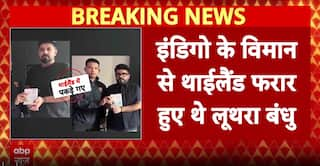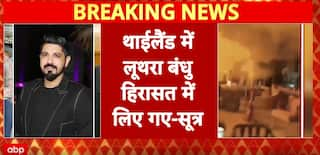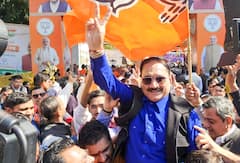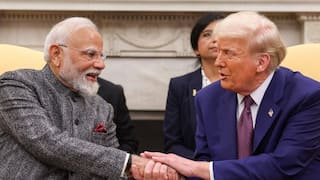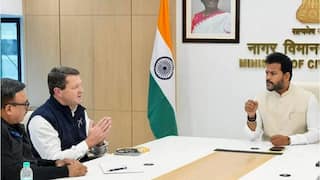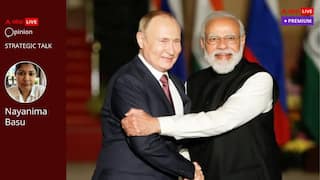Explorer
Electoral Bonds Scheme: All you need to know about the scheme on funding for political parties
The matter holds importance as the Centre and the Election Commission (EC) have taken contrary stands, with the former justifying the decision saying it would promote transparency in political funding while the latter maintaining that the changes made in the law would have "serious repercussions".

The application filed by Association of Democratic Reforms (ADR) NGO said the amendments carried out in the relevant Acts have "opened the floodgates to unlimited corporate donations to political parties and anonymous financing by Indian as well as foreign companies, which can have serious repercussions on the Indian democracy"./ REPRESENTATIONAL/ GETTY IMAGES
On Thursday, the Supreme Court said if the identity of the purchasers of electoral bonds meant for transparent political funding is not known, then the efforts of the government to curtail black money in elections would be "futile".
The top court reserved verdict on the plea of an NGO which has challenged the validity of the scheme and has sought that either the issuance of electoral bonds be stayed or the names of donors be made public to ensure transparency in the poll process.
The Centre vehemently supported the scheme saying that the purpose behind it is to eliminate the use of black money in elections and asked the court not to interfere with it at this stage and examine the whether it has worked or not only after the elections.
NEW DELHI: On NGO Association of Democratic Reforms’s (ADR) plea, which has sought a stay on the Electoral Bond Scheme 2018 notified by the Centre in January last year, the Supreme Court today directed all political parties to furnish receipts of political funding received through electoral bonds and details of identity of donors in a sealed cover to the Election Commission. The application filed by ADR NGO said the amendments carried out in the relevant Acts have "opened the floodgates to unlimited corporate donations to political parties and anonymous financing by Indian as well as foreign companies, which can have serious repercussions on the Indian democracy". The plea challenged the validity of the scheme and has sought that either the issuance of electoral bonds be stayed or the names of donors be made public to ensure transparency in the poll process. The matter holds importance as the Centre and the Election Commission (EC) have taken contrary stands, with the former justifying the decision saying it would promote transparency in political funding while the latter maintaining that the changes made in the law would have "serious repercussions". All you need to know about Electoral Bonds Scheme
- The government had in 2018 brought in the electoral bond scheme as an alternative to cash donations made to political parties as part of its efforts to bring transparency in political funding. Under the scheme, the name of the donor is known only to banks.
- The Centre said the bonds were introduced on January 2, 2018 to promote transparency in funding and donations received by political parties and that these can be encashed by an eligible political party only through their authorised bank accounts.
- It said the bonds did not have the name of the donor or the receiving political party and only carried a unique hidden alphanumeric serial number as an in-built security feature.
- The government amended various laws including the Income Tax Act, the Representation of Peoples Act, the Finance Act and the Companies Act and came out with the scheme for electoral bonds, which are in the nature of bearer instruments capable of being purchased by a citizen or a company from a PSU bank.
- Only the Political Parties registered under Section 29A of the Representation of the People Act, 1951 (43 of 1951) and which secured not less than one per cent of the votes polled in the last general election to the House of the People or the Legislative Assembly of the State, shall be eligible to receive the bonds.
- The bonds may be purchased by a person who is a citizen of India "or incorporated or established in India," the government had said in a statement last year.
- The bonds remain valid for 15 days and can be encashed by an eligible Political Party only through a Bank account with the authorised Bank within that period only.
- The scheme of electoral bonds notified by the central government in 2018 has been challenged in the Supreme Court. Alleging that the party in power was the major beneficiary of the scheme, ADR said that either it be stayed or the identity of the donors be disclosed.
Follow Election 2025 News on ABP Live for more latest stories and trending topics. Watch breaking news and top headlines online on ABP News LIVE TV
Read more
Personal Corner
Top Articles
Top Reels
ABP LIVE

Breaking: Putin Visits Rajghat, Offers Floral Tributes
ABP LIVE

Breaking: Left-Backed Citizen's Group to Demonstrate At Jantar Mantar Against Escalating Air Pollution
ABP LIVE

Breaking: Delhi High Court Urges Government to Take Urgent Steps to Curb Rising Air Pollution
ABP LIVE

Breaking: President Murmu To Witness Navy Day Celebration in Thiruvananthapuram
ABP LIVE

Delhi Car Blast: 3 Terror Suspects Arrested, Police Alleged links with Pakistani ISI






